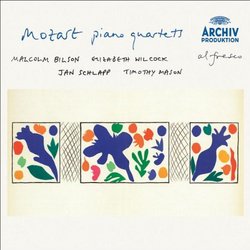| All Artists: Wolfgang Amadeus Mozart, Malcolm Bilson Title: Mozart: Piano Quartets Members Wishing: 0 Total Copies: 0 Label: Archiv Produktion Original Release Date: 1/1/2007 Re-Release Date: 10/9/2007 Genre: Classical Styles: Chamber Music, Historical Periods, Classical (c.1770-1830) Number of Discs: 1 SwapaCD Credits: 1 UPC: 028947767329 |
Search - Wolfgang Amadeus Mozart, Malcolm Bilson :: Mozart: Piano Quartets
CD Details |
CD Reviews4.5 stars -- a delightful recording with a nonmusical nonplu Larry VanDeSande | Mason, Michigan United States | 01/23/2008 (4 out of 5 stars) "First released after its 1987 recording and now re-released, this version of Mozart's piano quartets features fortepianist Malcolm Bilson and three associates in delightfully light and airy readings of the scores that nevertheless fulfill any requirement a hardcore Mozartean may want represented except for those seeking a high octane or supercharged account. The playing of the quartet -- Timothy Mason, Malcolm Bilson, Jan Schlapp and Elizabeth Wilcock -- is extraordinary throughout and the recording, while accessible to arguments it is too close and does little to capture the natural ambience of the recording venue, is outstanding. I've owned about a half-dozen recordings of these quartets and rarely have I heard one where all four instruments are so clearly identified and articulated throughout the recording process, especially when mated to such artistry. The quartet's approach is friendly, moderate, unsentimental and echt-Mozartean. With fortepianist Bilson -- who is both a well-known performer, recording artist and lecturer on period techinique -- a bit spotlighted, the production falls into the camp where the keyboard leads the parade. I find nothing objectionable about this since Bilson is such a wonderful player and the quartet members are equally well projected. Collectively, they capture every nuance of Mozart's scores. I admit my preference for the period keyboard before I say this is musically the most satisfactory recording of this music I can recall. Furthermore, I am completely enamored with the extraoridnarily highly detailed, close recording, which made it sound like Bilson et al were playing in my living room last night. For those that want a modern keyboard and instruments, I'd recommend the recording led by Paul Lewis. For those that like a more blended recording that reflects hall ambience, you too may want to look elsewhere. My one complaint about this issue is nonmusical but still substantial. DG has a legend for quality and the packaging on this Arkhiv re-release completely baffles me. The CD comes in an unusual four-fold cardboard box (it's a lot better than a plastic jewel case) but, with all that printing space available, includes only a couple paragraphs of generic notes and no individual track timings whatsoever! It shows the complete timing for each quartet and lists the movements by name but does not list track timing. This is like going back to the LP era when timing was often not mentioned. For this I deleted a half-star from what would have been a top rated review of this wonderful recording. These players clearly enjoyed making this recording and I'm glad DG brought it back almost 20 years later for another go-round. I don't know how well accepted this was in 1987, a time when period recordings still were somewhat controversial. In today's marketplace, I'd say this recording sits temperamentally in the middle of all versions of this music regardless of what instruments were used. For artistry, it is clearly one of the better ones." Two Elegant Performances of Mozart Piano Quartets From Malco John Kwok | New York, NY USA | 07/08/2008 (5 out of 5 stars) "
Noted British pianist Malcolm Bilson's fine recording of Mozart's Piano Quartet in G minor K. 478 and the Piano Quartet in E flat Major K. 493, have been reissued by Deutsche Grammophon's Archiv label to commemorate this label's 60th birthday as part of its Al Fresco series of reissues. Bilson, who is best known for his adherence to period performance practice on period instruments, yields superb period performance-inspired interpretations of both works with violinist Elizabeth Wilcock, violist Jan Schlapp and cellist Timothy Mason. Interpretations that are riveting and insightful, blessed with fine chamber music making of the highest order from Bilson and these three string musicians. Recorded back in 1987 at London's famed Abbey Road Studies, this early digital recording sounds rather fresh, almost as though it was recorded recently, not more than twenty years ago. Liner note enthusiasts may be disappointed with this recording's paucity, but they can be satisfied by looking up more information on this recording at Deutsche Grammophon's website. " |

